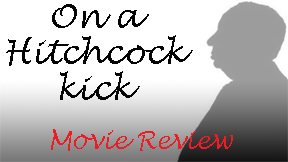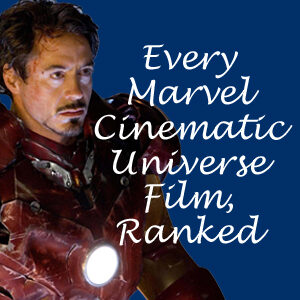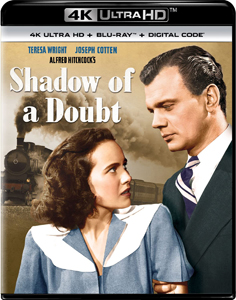There’s no doubt “Shadow of a Doubt” (1943) wouldn’t fly today without alterations. It’s a prime example of director Alfred Hitchcock’s principle that less is more. Uncle Charlie (Joseph Cotten) visits his sister’s family in Santa Rosa, Calif. – including his niece, also named Charlie (Teresa Wright), who sees him as a kindred spirit. But Young Charlie gradually suspects the beloved uncle is the notorious serial killer of widows sought by authorities.
Hitchcock doesn’t show Uncle Charlie strangling anyone, but Cotton gives a mischievous performance where we believe he could. The film therefore drips with menace even though it doesn’t show any violence until an attempted killing at the end. It’s like Spielberg hiding the shark in “Jaws” … if the shark was in plain sight.
Simple yet engrossing
Despite having the simplest of premises, “Shadow” is never boring thanks to the chemistry between Cotten and Wright. It’s also a wonderful film to simply soak up: This is among Hitchcock’s earliest films set in America, and a viewer can tell he’s delighting in the small town of Santa Rosa (where the film was likewise shot).

“Shadow of a Doubt” (1943)
Director: Alfred Hitchcock
Writers: Thornton Wilder, Sally Benson, Alma Reville (screenplay); Gordon McDonell (original story)
Stars: Teresa Wright, Joseph Cotten, Macdonald Carey
Jaunts to downtown’s bustle provide a wonderful time capsule. A crossing guard smiles while on duty, telling us without words that it’s magic to live in the Sunshine State. Hitchcock keeps the activity at the family’s house buzzing, even briefly experimenting with overlapping dialog (an approach modern TV shows like “Parenthood” and “This Is Us” would later refine).
Light humor comes from various angles, including precocious kid sister Ann (Edna May Wonacott), whose nose is buried in classic literature. The most memorable running gag features the dad (Macdonald Carey, later known for his “Days of Our Lives” narration) and his buddy Herbie (Hume Cronyn). The pair of crime buffs playfully speculate about the best way to kill the other and get away with it.
This lends dark humor to the proceedings because neither of them remotely suspects there’s a killer under their nose. Certainly Uncle Charlie’s sister, the adoring Emma (Patricia Collinge), is hopeless to notice anything amiss. Meanwhile, we suspect Uncle Charlie at about the same pace Young Charlie does. But perhaps a bit quicker, as – although it’s not as extreme as her mother’s — she does have a blind spot to overcome.
Does the plot hold up to scrutiny?
(SPOILERS FOLLOW.)
While I find “Shadow” to be as effective as Hitch needs it to be, I do have questions about the plot. Government agents (presumably the FBI, although the film doesn’t name the agency; same with “Notorious”) are pursuing two suspects in the Merry Widow Killer case: Uncle Charlie and another random guy out East.

There’s no sense that Uncle Charlie worked with or framed another man. As such, it’s apparently dumb luck that another guy is suspected, and that this person runs from the authorities (as we hear from reports) and accidentally gets himself killed. Luckier still: The agents in Santa Rosa consider the case closed.
They don’t seem like the lazy or corrupt types to wash their hands of a case just because one suspect is dead, yet that is what they do. Uncle Charlie’s luck is so incredible that it could be the theme of the film at this point.
Could there be another answer?
Also around this time, Hitch makes light suggestions that perhaps Herbie is not to be trusted, as the family friend acts a little suspicious during one of the tries on Young Charlie’s life. There’s a “shadow of a doubt” over Uncle Charlie’s guilt. But then he puts all his cards on the table, leading to the grand finale.
The last half-hour or so is interesting, as the film could end at any point; the director gets a measure of suspense out of a viewer wondering if “The End” will suddenly appear on the screen. It’s up to Hitch to decide how much he wants to reveal. I’m surprised that he thoroughly answers the question of Uncle Charlie’s guilt, but not surprised that he doesn’t dig deeply into the nature of his murderous mind or methods. (We know from the famous dinner table speech that he hates rich widows, but we don’t know where that prejudice comes from.)
In this unusual case, the underdevelopment of a villain’s schemes and motivations requires the actor to do most of the work, and it’s to Cotten’s benefit. Wright is an excellent scene partner, subtly graduating from innocent to mature as observations of Uncle Charlie’s odd behavior percolate in Young Charlie’s brain.
“Shadow of a Doubt” asks everything from its stars in order to pull off suspense that’s barely in the screenplay. No modern filmmaker or studio would be willing to go this far – or this short, as it were. Hitchcock proves, in this case, that less is fascinatingly more.
RFMC’s Alfred Hitchcock series reviews works by the Master of Suspense, plus remakes and source material. Click here to visit our Hitchcock Zone.

